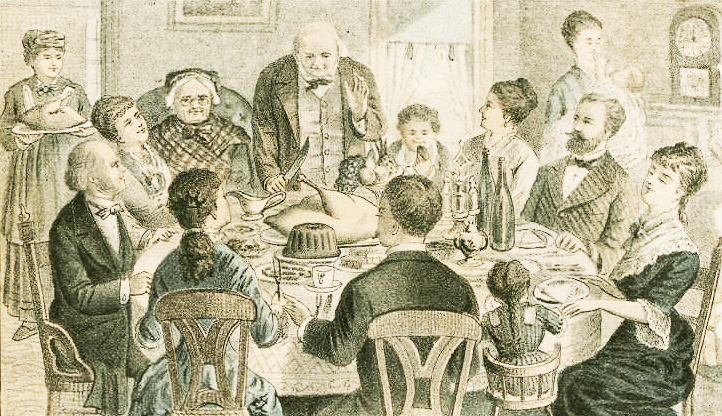
Despite being surrounded by unprecedented levels of opportunity and prosperity, we live in a profoundly anxious age, fearful of economic disruption even as we resist the pull to idolize status, wealth, and comfortability.
When observing the vices that persist amid economic freedom and abundance, many are quick to proclaim, “The market is not enough!” And they’re right. We also need gratitude.
“We should bow in gratitude to God for His many favors,” said President Calvin Coolidge in his 1925 Thanksgiving Proclamation, remarking on a similar burst of prosperity. “As we have grown and prospered in material things, so also should we progress in moral and spiritual things.”
Yet while gratitude and thanksgiving are widely seen as valuable virtues in daily life, do we fully understand that macro impact of those micro attitudes, in and across the economic order?
As Dr. Robert Emmons summarizes in his book, Thanks! How Practicing Gratitude Can Make You Happier, numerous scientific studies have proven that gratitude has far-reaching positive effects on human happiness and wellbeing. This translates into mundane perks like better sleep and increased energy, but extends far deeper into areas like emotional stability and community action. For a good summary, see ORBITER Magazine’s recent round-up of research.
In the following video, Emmons offers four reasons for why gratitude “works,” and why it matters:
Here, again, Emmons is focused on personal happiness, but if we step back and consider the broader impact on social relationships across the economic landscape, we begin to see the transformative power of gratitude in new and surprising ways.
I’ve re-stated Emmons’ four reasons below, including condensed quotes and a quick response to each in hopes of connecting the dots between personal gratitude and a cultural ethic of thanksgiving.
1. Gratitude allows celebration of the present.
Positive emotions wear off. Our emotional systems like newness. They like novelty. They like change…Gratitude involves the appreciation of the value of something. When we appreciate the value of it, we’re less likely to depreciate the value – to lose the value. Therefore, we extract more benefits…It allows us to participate, to celebrate. We spend a lot of time spectating…With gratitude we become participators.
Put another way, gratitude curbs our consumerism, allowing us to participate in economic abundance without turning our material blessings into idols of comfort, status, or self-indulgence. Without gratitude, we become idle spectators, indulging in a static system filled with static stuff. Not surprisingly, society will follow, in turn.
2. Gratitude blocks toxic emotions (envy, resentment, regret, depression).
You can’t be envious and grateful at the same time…You can’t resent someone for having something that they have but you don’t if you are grateful.
Amid economic dynamism and specialization, gratitude allows us to appreciate the diversity that surrounds us, viewing existing inequalities with a discerning eye – “is it just or unjust?” – and responding with love, creativity, and service, regardless of the answer.
Further, as Victor Claar has explained, toxic emotions like greed and envy quickly lead democratic societies toward “envious majorities” that pursue self-centered economic decisions and push for policies to “narrow the gap between them and the targets of their envy.”
3. Grateful people are more stress-resilient.
In the face of serious life situations: trauma, adversity, and suffering. If people are dispositionally grateful, they recover faster. They’re less bothered by some of the negative emotional symptoms…It gives people perspective by which they can interpret life events.
In our age of economic disruption, gratitude instills a joyful resilience that helps us navigate hardship, change, and the constant shifts and readjustments required by the modern global economy. Without a backbone of thanksgiving, we’re prone to adopting an economics of fear and protectionism and a cultural disposition of anxiety and resentment.
4. Gratitude strengthens social ties and self-worth.
When you are grateful, that’s information that someone else is looking out for you…You notice a network of relationships — past and present — pf people who are responsible for helping you get to where you are right now…Once you start to recognize the contributions that they’ve made, either intentionally or unintentionally, you start to feel much better about your position in life.
When we wield humility and give thanks for all that we have and all that we’ve accomplished — whether to God, family, friends, or the miracle of the marketplace — fully recognizing our relationships and support systems, we are able to look beyond ourselves. The best part? We feel empowered to use our economic or social privilege as a means to do good.
When we begin to view gratitude in such a way — seeing how it relates and applies to our daily economic lives, as well as the lives of others — we quickly see how it’s influence goes far beyond personal happiness.
Gratitude and thanksgiving instill a deep joy that connects the personal with the communal.
Being good stewards of thanksgiving isn’t always easy, particularly in our age of shortcuts and convenience, anxiety and entitlement. Yet despite the constant call of those competing emotions and priorities, the flourishing of the free and virtuous society depends on it.
Image: Public Domain

